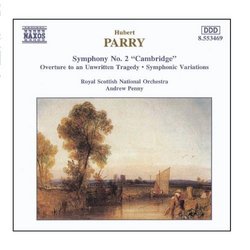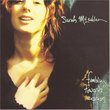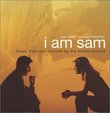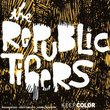| All Artists: Andrew Penny Title: PARRY: Symphony No. 2 / Symphonic Variations in E minor Members Wishing: 0 Total Copies: 0 Label: Naxos Release Date: 8/4/2009 Genre: Classical Styles: Forms & Genres, Symphonies, Symphonies Number of Discs: 1 SwapaCD Credits: 1 UPC: 730099446921 |
Search - Andrew Penny :: PARRY: Symphony No. 2 / Symphonic Variations in E minor
 | Andrew Penny PARRY: Symphony No. 2 / Symphonic Variations in E minor Genre: Classical
PARRY: Symphony No. 2 / Symphonic Variations in E minor by Andrew Penny |
Larger Image |
CD DetailsSynopsis
Album Description PARRY: Symphony No. 2 / Symphonic Variations in E minor by Andrew Penny Similarly Requested CDs
|
CD ReviewsSpirited and animated Symphonic Variations Joseph E. Jalbert | Dover, NH USA | 11/02/1998 (3 out of 5 stars) "Being an American, this CD constituted my first exposure to the music of Charles Hubert Parry. Since then I have acquired and enjoyed much more of the work of the almost forgotten victorian master. This CD remains a favorite. For those unfamiliar with Parry, he was a contemporary of Wagner and Brahms, impressed by both. His music was most popular before the first world war, but - at least the symphonic music - lay almost forgotten after his death in 1918. Very "english" in style, he wrote 5 symphonies, a wonderful piano concerto and innumerable works for chorus, including "Jerusalem" and "I was glad." The renditions of the second symphony and "overture for an unwritten tragedy" are good, but the reading of the "Symphonic Variations" stands out. Given a deliberately light touch, it rollicks, not plods. The hornpipe-like main theme is agreeably varied until, in the last bars of the piece, it inverts to a well known nautical theme, which I will not reveal. Buy it to find out. Incidentally, there exists a fine series of reading of the Parry Symphonies on Chandos, but the "Symphonic Variations" as recorded there is much more deliberate, measured and leaden." Das Land Ohne Musik Joseph Barbarie | new haven, CT | 10/16/2007 (4 out of 5 stars) ""Das Land ohne Musik," was Mendelssohn's grim verdict on English musical culture ("the land without music"). He was right, at the time. Aside from Purcell -- who predates Vivaldi, in any event -- those musicians most closely associated with England, i.e., Handel, Haydn, Clementi, Cramer, Salomon, Pleyel, were emigres, usually from Austria or Germany.
However, the latter part of the 19th century saw the flowering of native English composers. While modern taste seems to have given the laurels to the mincing Sir Arthur Sullivan (and his pale "Savoy Operas") or the lush Gothic Romanticism of Elgar, the truth is these two were but tips of a decently-sized iceberg. Names like Parry, Stanford, Sterndale Bennett, and Attwood have become footnotes in musical encyclopedias. There may now be a bit of revival (courtesy of adventurous labels like Naxos, or Hyperion, whose approach tends towards chauvinism in favor of British composers). Parry's symphonic talent is on full display in this Naxos offering, particularly his knack for writing punchy little cells with strong accents which are particularly ripe for symphonic argument. In addition, their compactness allows for transmogrification back and forth between melody and accompaniment. While the technique goes back to Haydn, Beethoven is recognized as its avatar. The main themes of Symphony No. 2's scherzo and of the "Overture to an Unwritten Tragedy" are examples of this. There is something Schumannesque, as well, in Parry's orchestral sound, in its richness and brightness. At times, as well, Parry's massive slabs of brass and strings have a Nordic or Russian bulk to them, like Sibelius or Tschaikovsky. The playing on this disc is probably not the best (I detected some sour horn-intonation here and there) but this is a small price to pay for such a welcome recovery from that lost or overlooked portion of symphonic literature. This is strongly recommended for fans of symphonic music of the old, better stamp (i.e., Beethoven, Sibelius)." |

 Track Listings (6) - Disc #1
Track Listings (6) - Disc #1








